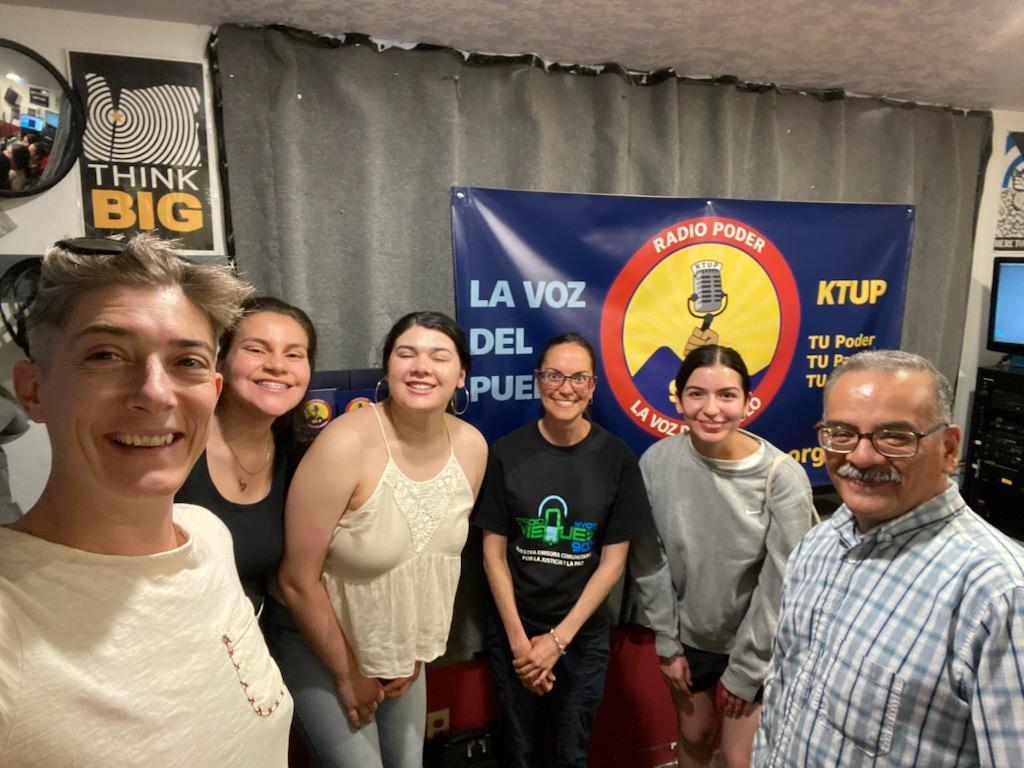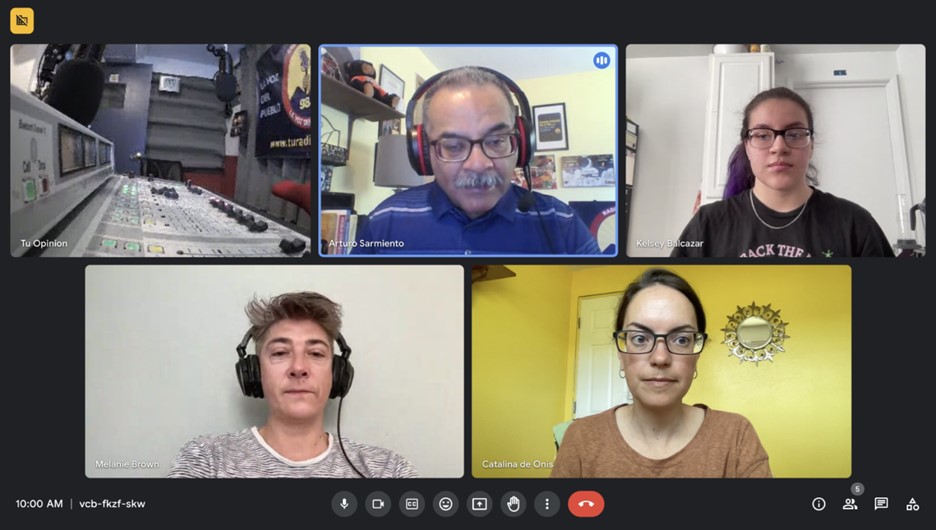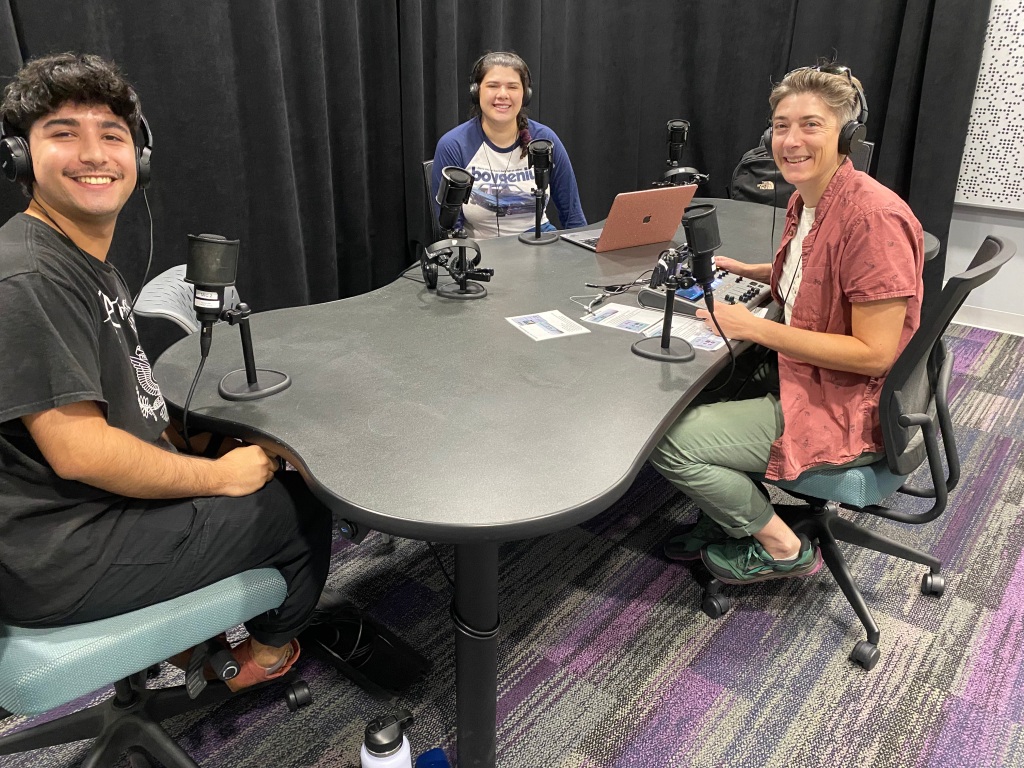Español
The Sound of Science and Justice
A program on Radio Poder, 98.3 FM KTUP, La Voz del Pueblo


This program focuses on science storytelling for Latine/x/a/o people and communities in the Willamette Valley. During summer 2023, El Sonido de la Ciencia (The Sound of Science) has aspired to reach audiences and communities frequently ignored and marginalized by mainstream news media and governmental actors who make decisions regarding public health and the application of scientific knowledge. El Sonido de la Ciencia features interviews with scientists, students, non-profit organizations, artists, and many others.
The idea for this programming came from conversations between journalists Arturo Sarmiento and Melanie Brown and Professor Catalina de Onís. With the collaboration of University of Oregon students Kelsey Balcazar, Maya Ríos, and Bryanda Quevedo, this idea has become a reality.
During the following months, the programming will continue with a focus on environmental, climate, and energy justice in the Willamette Valley. The program title will add the theme of justice to become El Sonido de la Ciencia y la Justicia (The Sound of Science and Justice). Professor Catalina de Onís will collaborate with various students to support this community radio effort. The show continues!
The production team appreciates support from the US/UK Fulbright Commission and Rita Allen Foundation, as well as from the University of Oregon’s Center for Science Communication Research, Latinx Studies, Center for Latino/a and Latin American Studies, and the Clark Honors College.

Listen to the story behind this storytelling project with Arturo Sarmiento, Kelsey Balcazar, Melanie Brown, and Catalina de Onís!
“La ciencia es un agua que necesitamos”.
“Science is a water that we need.”
-Arturo Sarmiento, Radio Poder Director
INTERVIEWS
Ep. 1: Professor Ernesto Alvarado speaks about climate change and offers suggestions for how to live with forest fires, especially in migrant communities.
Ep. 2: Ira Cuello-Martínez, PCUN climate policy coordinator, speaks about the incinerator in Brooks and state legislation to regulate the facility’s emissions.
Ep. 3: Nicole Martínez Llaurador, University of Oregon doctoral student, describes the importance of native bees. Learn more at https://www.oregonbeeproject.org/.
Ep. 4: The Museum of Natural and Cultural History in Eugene offers bilingual science programming for children; plus, Ruby Canchola highlights the goals of the Society of Hispanic Professional Engineers.
Ep. 5: Professor Alejandro Damian-Serrano speaks about fascinating ocean creatures and how they absorb carbon, among other related topics.
Ep. 6: Alejandro Tecum describes the importance of regenerative agriculture and related programs offered by Adelante Mujeres.
Ep. 7: Poet and artist Nitza Hernández-López explains the connection between art, science, and social justice and how she works with these themes in her forthcoming poetry book.
Ep. 8: Sebastián Ibáñez Sanhueza discusses his lab work on hair and hormones and why this focus matters for human health.
Ep. 9: PCUN Projects Coordinator Andrea Garcia Torres describes the risks created by forest fires and how farmworkers and other outdoor workers can care for their health.
Ep. 10: Justin Sandoval, of Cascadia Mobility, describes the importance of bike riding, and we offer a scientific report about this activity.
Ep. 11: Beatrice Serrano-Martinez, a board member of Straub Outdoors, describes the personal and cultural significance of hiking, and we offer a scientific report about this activity.
Ep. 12: Retired professor Patricia Varas and scientist Itzel Espinoza reflect on the health benefits of swimming and how to avoid cyanobacteria when out in fresh water, in their respective interviews.
Stay tuned for more episodes!
